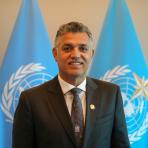Opening address to the 61st session of IPCC
His Excellency Peter Dimitrov – Minister of Environment and Water of Republic of Bulgaria
Distinguished National IPCC Representatives,
Distinguished Representatives of the United Nations System
Dear Representatives of Partner Organizations,
Dear Colleagues,
Ladies and Gentlemen,
Welcome to the 61st session of IPCC.
On behalf of the World Meteorological Organization, I stand before you today at a pivotal moment in human history. This 61st session of the IPCC marks is therefore not just another meeting, but a milestone in our collective journey towards a sustainable future.
I wish in particular to express WMO's appreciation to the Government of Bulgaria for hosting this IPCC Plenary. It clearly demonstrates Bulgaria’s commitment to collaborate with the efforts undertaken by WMO and the World Scientific Community, to meet the challenges faced by society on account of climate change and its impacts.
I wish to greet Professor Jim Skea, Chair of IPCC and Dr. Abdalha Mokssit, IPCC Executive Secretary and commend the IPCC Secretariat for your great efforts in organizing this Session.
Dear Participants,
The World Meteorological Organization (WMO) and the UN Environment Programme (UNEP) jointly established the IPCC in 1988. WMO has been proud to host the IPCC Secretariat since then.
Since its inception, the WMO has been a proud and strong supporter of the IPCC, recognizing the vital role robust climate science plays in shaping global policy.
Together, WMO and UNEP have forged a path of collaboration through IPCC that has yielded groundbreaking scientific assessments reports. These scientific assessments inform vital policies that underpin global climate action and pave the way for sustainable development.
The recent WMO’s state of Global Climate 2023 report sounded a critical alarm: Let see some highlights of the report:
• 2023 was the warmest year on record
• It was 1.45 degrees above preindustrial levels
• Records were broken for ocean heat, sea level rise, Antarctic Sea ice
loss and glacier retreat
• The rate of sea-level rise in the past 10 years (2014–2023) has more than
doubled since the first decade of the satellite record (1993–2002)
• Drought affected millions in 2023
The report also highlighted to key factors:
- Transition to Renewable Energy offers hope.
- The Cost of climate inaction will be significantly higher than cost of climate action.
Dear Participants,
COP 28 recognized the above and was a turning point towards climate action:
COP 28
• Tripled our ambition regarding renewable energy goals:
• It prioritized climate and health, and
• Embraced nature-based solutions for mitigation and adaptation.
To achieve these COP 28 ambitions we need science that informs real-world solutions for every region on the planet.
The WMO is stepping up:
We organized a scoping workshop towards establishing a Global Center for Weather, Climate & Water related services for Renewable Energy in UAE in last week.
With the World Health Organization (WHO) through our Joint Office for Climate and Health we have a 10-year Implementation Plan to contribute to COP 28 Climate and Health outcome.
We are supporting the development and implementation of the Global Ecosystems Atlas for nature-based solutions
All of us here today know that we need to strengthen communications to bridge the gap between science and policy.
Let's make the IPCC's science actionable and turn knowledge into global climate action!
Let's harness this momentum and deliver concrete actionable actions to COP 29.
Dear Participants,
Let me now turn now also to the “WMO’s Shield and Sword Against Climate Change” -
“The Early Warning Systems and the Global Greenhouse Gases Watch.” Early Warning Systems are our lifeline. They provide timely warnings about floods, droughts, and heatwaves, empowering communities to prepare and minimize damage. In vulnerable areas, these warnings can be the difference between survival and devastation. They build resilience by promoting preparedness, early action, and community engagement.
The Global Greenhouse Gases Watch supports the IPCC's mitigation efforts. It systematically monitors greenhouse gas levels, providing data to understand trends, assess mitigation effectiveness, and inform policy. It also promotes transparency and provides a mechanism to hold countries accountable for their climate commitments.
These WMO initiatives are essential in the fight against climate change. They provide critical information, bolster resilience, support scientific assessments, and most importantly, foster international cooperation.
Dear Participants,
The year 2027 holds immense promise.
With "Early Warnings for All" reaching its target and the IPCC's Special report on Climate Change and Cities arriving in March 2027, we have a unique window to turn knowledge into action.
Cities are the engines of our world, but also highly vulnerable. 80% of global GDP is produced in cities. Building a sustainable future for our cities demands global collaboration. Through "Early Warnings for All," we can shape Climate solutions for all cities.
WMO, UNEP and IPCC Together, let's build a legacy of international cooperation and innovation that safeguards our cities and our planet.
Let us leverage the expertise and unity embodied in this Plenary Session to propel us towards our shared goals and build a legacy of cooperation and innovation that transcends borders and leaves a lasting impact on our planet.
I wish a Successful IPCC 61 session.
Thank you.
Statement by


